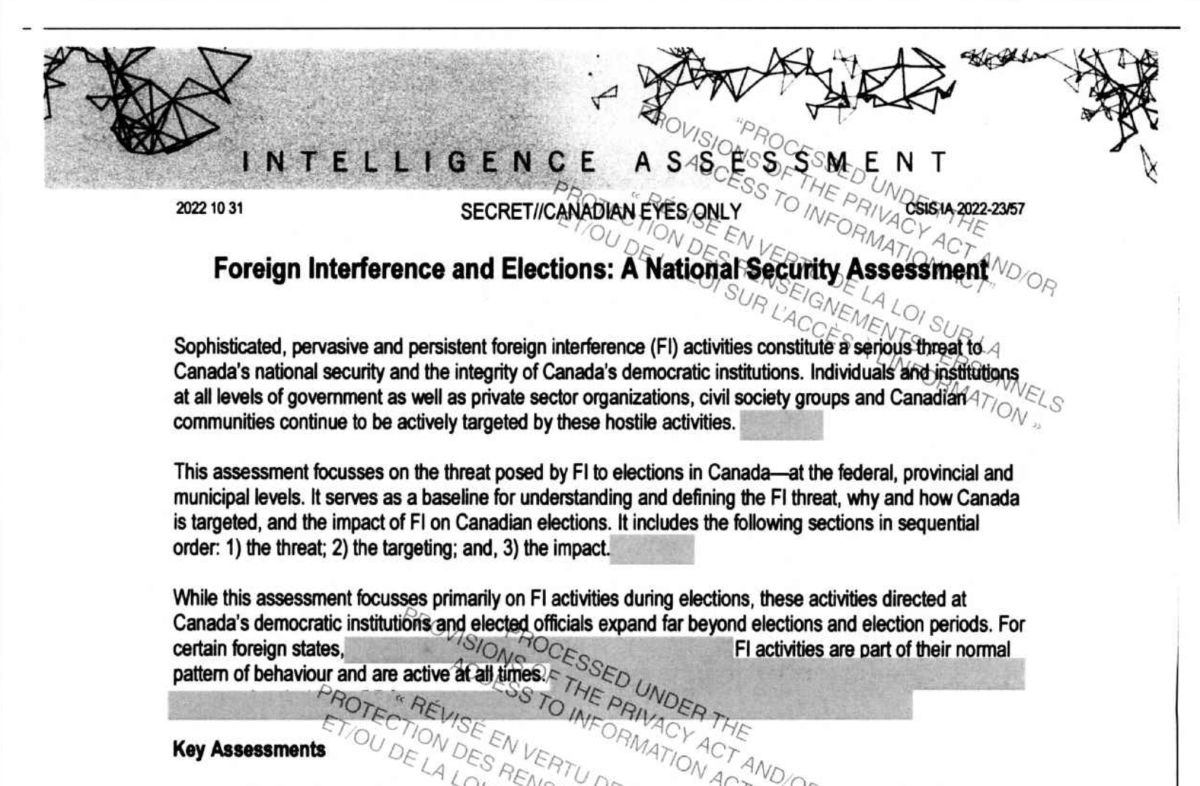Foreign interference networks are “deeply embedded” in Canadian politics, and operate at every level of government, according to a declassified intelligence report obtained by Global News.

The Canadian Security Intelligence Service report, released under the Access to Information Act, also warned that foreign interference was “incrementally” weakening Canada’s democracy.
It said foreign interference, or FI, was unlike traditional diplomatic activity in that it used secrecy and deception to influence Canadian policy-making, public narratives and civil society.
“FI networks are active throughout Canada, and at all levels of government. Many of these networks are deeply embedded in Canada’s political and social fabric,” the report said.
A commission of inquiry, ordered by the government of Prime Minister Justin Trudeau, got underway in Ottawa on Monday. It is examining foreign interference in Canada’s 2019 and 2021 federal elections.
The inquiry was launched in response to reports by Global News and the Globe and Mail that raised the issue of Chinese foreign interference, but that were initially downplayed by the government.
But while the earlier news reporting was based largely on leaked intelligence reports, the materials released to Global News this week were officially disclosed by CSIS through the ATIP process.

The CSIS Intelligence Assessment, titled “Foreign Interference and Elections: A National Security Assessment,” was dated Oct. 31, 2022, and painted a grim picture of the threat.

Get daily National news
The document was not among those tabled at the inquiry, which called China the “foremost perpetrator” of foreign interference in Canada, and described the targeting of Conservative MPs on Chinese social media platforms.
Targets of foreign meddling include diaspora groups, media outlets and federal, provincial, municipal and indigenous governments, as well as “various facets of Canadian civil society,” the CSIS report said.
Election periods are “crucial for FI activities,” the report added. Elections are viewed as “windows of opportunity” by overseas governments that want to “influence or sway electoral outcomes.”
“During elections, Hostile Activities by State Actors (HASA) employ FI to influence Canadian politics by i) clandestinely supporting individuals who are perceived to be receptive to foreign state interests, and ii) opposing individuals who are perceived to be against these foreign states,” it said.
But elections are not the only weakness.
“While this assessment focusses primarily on FI activities during elections, these activities directed at Canada’s democratic institutions and elected officials expand far beyond elections and election periods,” it said.
“For certain foreign states … FI activities are part of their normal pattern of behaviour and are active at all times.”

The report emphasized the damage caused by foreign interference, noting that it “harms Canada and Canadians by eroding sovereignty, democratic processes and values.”
“FI activities incrementally weaken the fabric of Canadian democracy, subtly diminish the hard-won social cohesion of a multicultural society, and impinge on the Charter rights of Canadians.”
While CSIS wrote that it was “undertaking active efforts” to counter foreign interference, it said political parties also needed to do their part to “build their own resilience” against the problem.
Much of the report was blacked out. No countries are named in the parts made public, but other materials released to Global News at the same time name China and India as top threats.
A Feb. 24, 2023, report titled “Briefing to the Minister of Democratic Institutions on Foreign Interference,” called China “by far the most significant threat.”
“We know that the PRC sought to clandestinely and deceptively influence the 2019 and 2021 federal elections,” according to the briefing.
A separate CSIS intelligence assessment, dated March 21, 2022, was titled “How PRC Foreign Interference Undermines Canadian Values, Electoral Processes.”
PRC refers to the People’s Republic of China.
“The PRC’s sophisticated, pervasive and persistent efforts to promote its interests through political interference undermines Canadian sovereignty, are anti-democratic, and have divisive effects on Canadian civil society, particularly within Chinese-Canadian communities,” it said.
“Without credible deterrents, the CCP’s interference will continue to (i) erode Canada’s free and tolerant society; (ii) weaken the rules-based international order upon which our national security and material prosperity depend; and (iii) stifle objective criticism of the PRC.”
Stewart.Bell@globalnews.ca









Comments